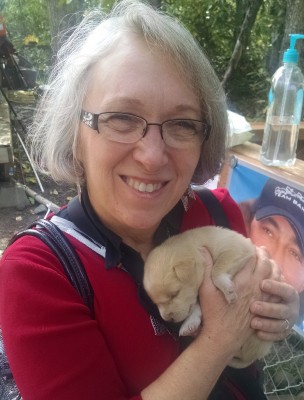“We Trusted the School to Properly Lead Them”
Ray and I each decided to read a book about Alaska during our trip there in mid-August. The book I chose was about Native Alaskans and was written by an Inupiaq. It was a natural choice for me, because I love to learn about native cultures.
The author was born in 1941 and was the illegitimate child of a mother who took him and his sister away from their extended family when he was very small. His father was a man of European descent who never acknowledged his son.
When the author was three years old, a male relative found the children neglected and living in moral and physical squalor in Fairbanks. They were about to be removed from the mother’s home, but the relative convinced social services to let him take the little boy back to their native town.
There he was reared in the traditional way by a loving extended family, whose elders taught him how to be an Inupiaq. The family lived a semi-nomadic life, spending part of the year in the village and other parts in the bush. They hunted; they gathered berries; they stored food for the winter; and they traveled by dogsled.

In traditional Inupiaq culture and the other native cultures of Alaska, elders were given the highest respect. They were served first at group meals and children brought them the first bucket of berries in summer.
Both men and women learned to sew because a man might have to sew something when he was away from home on a hunt. Children brought the elders their first bit of sewing, as well as the first bird and the first animal they hunted.
The Alaska Native Heritage Center (ANHC) had a display about the importance of elders. I loved this quote by Levi Mills Sr. of Kotzebue, Alaska, that I read there:
It is good, when the Elders, who have a lifetime of living experience, advise the younger people . . . The young are not born knowing good living patterns. They are empty until they fill their “vessel” with good advice. They don’t understand yet the full implications of what a good life is about. They haven’t lived long enough to know on their own. When they don’t use the advice that is handed down to them, sometimes they place themselves in embarrassing situations that bring shame to their parents and relatives, and they are unable to look people in the eye.
In the book and at the Heritage Center, I learned about the purposeful efforts of public schools in the past to destroy the native language and culture that children had once learned from their elders.
Suddenly it struck me that Christian parents in many places across America are in that exact situation today. Many children are going to schools that are purposefully working to destroy their “native language and culture,” the Christian heritage of their parents.
Consider this quote at the NAHC by Peter Jacobs of Bethel, Alaska:
When they all entered the school, I thought, “Ah, the school will take better care of my children than us.” We made a mistake about the school. We never told our way of life. We trusted the school to properly lead them.
Keep on keeping on, you amazing homeschool heroine!
Now this is the commandment, the statutes and the judgments
which the Lord your God has commanded me to teach you,
that you might do them in the land where you are going over to possess it,
so that you and your son and your grandson
might fear the Lord your God,
to keep all His statutes and His commandments which I command you,
all the days of your life, and that your days may be prolonged.
Deuteronomy 6:1-2

